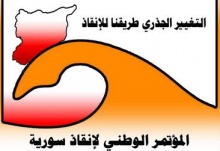It was the first public meeting of opposition forces since June 27, 2011, when they held the famous conference in the Samiramis hotel. From the side of the authorities the meeting was not only tolerated but they also provided security. Official signals, however, were quite equivocal. Only three days ahead of the conference senior leader of the NCB have been kidnapped. The NCB blames the air force intelligence while the authorities refuse any responsibility and point at “terrorist groups”. This can be read both as a double game or as differences within the apparatus.
The great interest of Russia, Iran and China in such an event, who were present with high-ranging representatives, were certainly a factor which contributed to make such a gathering possible.
In a statement of principles the conference affirmed “to adopt non-violent resistance as the strategy to accomplish the goals of the revolution. We recognize that militarizing the revolution (arming civilians) is a danger to both the revolution and society. In this context we view the “Free Syrian Army” as an objective phenomenon that emerged from the refusal of Syrian soldiers to kill their fellow countrymen who protested peacefully, and from this perspective we consider the “Free Syrian Army” one of the components of the revolution. As such, it has a duty to support, strengthen and defend the peaceful strategy of the revolution.”
This is a very bold and brave statement proving that the NCB is not a fake opposition. It is affirming the legitimacy of the revolt including by armed means. At the same time it is calling the armed forces of the rebellion to subordinate to the primacy of politics, to give priority to the mass mobilization and to open up for a political solution.
Apparently this is the center piece of the political operation of the NCB. The conference is witnessing to the Syrian people and its diverse political representations that such a position is possible. It is signaling that a political process can start. This is not a small achievement.
The conference re-elaborated the positions of the NCB. It called for the toppling of the regime and a transition to democracy by peaceful means. It condemned sectarianism. It reaffirmed the rights of the Kurdish people while maintaining the unity of Syria. And it pledged support to the Palestinians and the Syrian claim on the Golan Heights.
As concrete and immediate step to halt the violence the conference demanded a cease fire to be contributed to by both sides. To the regime they addressed the immediate need of humanitarian relief, the release of the political prisoners, the right to free expression and demonstration.
The conference called upon the UN special envoy Lakhdar Brahimi to organize an international conference to pave the way for a political solution.
A permanent committee was established charged with the task to keep the started process open and to reconvene in due time.
Asked by telephone, Haytham Manna, international spokesman of the NCB, called the conference a positive step: “There are many friendly reactions from Syria and even hostile forces are obliged to recognize the event.”
Egypt key
Apparently the main players on both sides are still not ready for a political solution. At the same time it becomes more and more obvious to neither side is able to win militarily prolonging the conflict and increasing the sectarian tensions.
Not only for the popular movement a cease fire and a de-escalation would be favorable. Also Russia and Iran are truly interested in such as they also know that Assad cannot win.
The key lies now with Egypt. They have signaled their readiness for a regional negotiation process including Iran – a decisive precondition violating the old regime’s policy of isolating Iran to please the USA. The new regime yields great influence over the Muslim Brotherhood and could force them to the negotiation table. A kind of détente between Cairo and Tehran is necessary. Tehran needs to force upon Assad significant concessions. In return Cairo comes back as the main regional power to the detriment of both Saudi Arabia and the USA. Such an important geo-political change as another step away from the mono-polar US world order is no more impossible but might need some more time and maybe further popular pressure on the Muslim Brotherhood. It will, however, not come without troubles as the US will not just step aside and watch their empire crumble.
Meanwhile the pole for a political solution within Syria must grow and the brave initiative of the NCB must be supported by all means. It is the only possible anti-imperialist solution.

